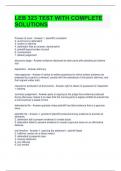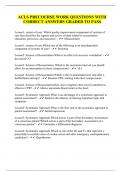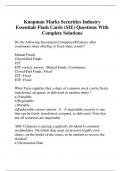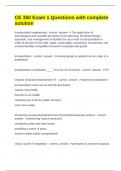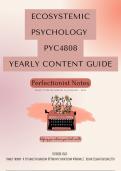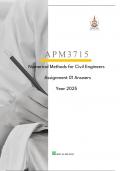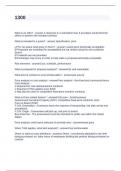SOLUTIONS
Process of court - Answer-1. plaintiff's complaint
2. summons to defendant
3. motion to dismiss
4. defendant files an answer: denial/admit
5. plaintiff bears burden of proof
6. counterclaim
7. default judgement
discovery stage - Answer-evidence disclosed to each party after pleading but before
trial
deposition - Answer-tetimony
interrogatories - Answer-A series of written questions for which written answers are
prepared by a party to a lawsuit, usually with the assistance of the party's attorney, and
then signed under oath.
request for production of documents - Answer-right to obtain to purposes for inspection
+ copying
summary judgement - Answer-party is arguing to the judge that evidence produced
during discovery makes it so clear that the moving party is legally entitled to prevail that
a trial would be a waste of time
defendants file - Answer-granted unless plaintiff has filed evidence that is a genuine
issue
plaintiffs file - Answer-1. granted if plaintiff produced strong evidence to provide all
elements
2. defendant fail to present evidence to create doubt
3. defendant failed to present evidence to create a genuine issue on an affirmative
defense
trial timeline - Answer-1. opening the statement - plaintiff leads
2. halftime: motion for a direct verdict
3. defendant's presents case
4. closing statement
5. jury discuss
6. jury verdict
, 7. motion for JNOV
motion for JNOV - Answer-asking judge to substitute jury's verdict with judge's
judgement
Arbitration - Answer-2 sides that otherwise may go to court, instead both sign a contract
which has them agree to never going to court, and submit evidence to an arbitrator
legally binding
meditator - Answer-like counselors, not legally binding
supreme court conservative judges - Answer-lito, thomas, berrett, gorsich, kavanaugh
supreme court middle judge - Answer-roberts (chief)
supreme court liberal judges - Answer-sotomayor, kagan, jackson
conservative judges - Answer-read as plainly of the constitution
liberal judges - Answer-fresh look at law in each case
courtpacking - Answer-Roosevelt proposed to expand the supreme court --> never
happened because the judges flipped their vote to avoid this. changes to 8L- 1C
burton vs. wilmington case - Answer-since the restaurant reviewed government land,
state action doctrine allowed him to sue
state action doctrine - Answer-rule stating that only the actions of state and local
governments, not those of private individuals, must conform to the equal protection
clause
due process options - Answer-procedural & substantive
procedural - Answer-if government is gonna take away life, liberty, or property, they
have to follow procedures to be fair + reasonable
Appelate court's 2 decisions - Answer-affirm or remanded
summary judgement - Answer-terminating case before it goes to trial (evidence is super
clear)
sources of law - Answer-constitution, statutes, adminsitrative regulations, common law
statutes - Answer-law passed by Congress or state legislature (pass House and Senate
and President signed)

